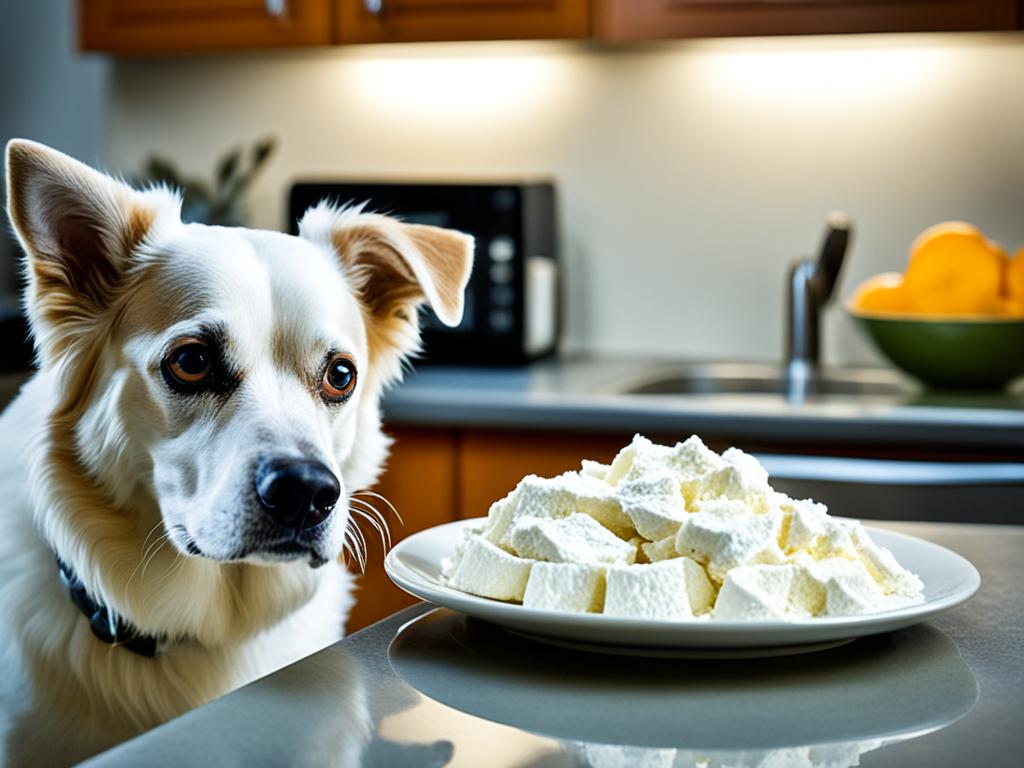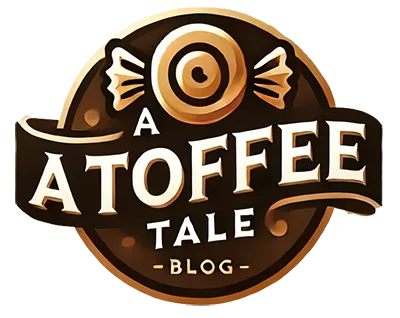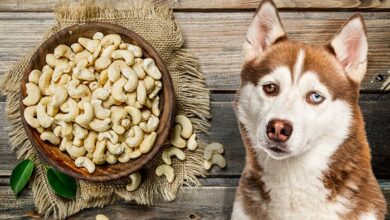Ricotta Cheese for Dogs in 2024: Best Safe Treat or Risky Snack?

Ricotta cheese, a creamy delight with Italian origins, has carved a delectable niche in culinary traditions worldwide. Renowned for its smooth texture and mild flavor, ricotta boasts a rich history and versatile presence in both human and canine cuisines.
But it’s not just humans who appreciate the allure of ricotta cheese. In recent years, there has been a growing interest in incorporating this versatile ingredient into the diets of our canine companions.But can dogs eat ricotta cheese? With its nutritional benefits and palatable texture, ricotta offers a tempting addition to dog-friendly recipes, providing a flavorful boost to their meals.
As we explore the world of ricotta cheese, we uncover not only its culinary versatility but also its potential to enhance the dining experience for our furry friends. So, whether enjoyed by humans or shared with our beloved pups, ricotta cheese adds a touch of creamy indulgence to every dish it graces.
Nutritional Profile of Ricotta Cheese:
Macronutrient Content:
Protein: It typically contains around 10-14 grams of protein per 100 grams serving. Protein is essential for muscle development, tissue repair, and overall growth.
Fat: It is moderately high in fat, with approximately 10-15 grams of fat per 100 grams serving. Fat provides energy, supports cell function, and aids in the absorption of fat-soluble vitamins.
Carbohydrates: It contains minimal carbohydrates, usually less than 3-5 grams per 100 grams serving. Carbohydrates serve as a source of energy but are not a significant component of ricotta cheese.
Micronutrients:
Vitamins: It is a good source of various vitamins, including vitamin A, which supports vision, immune function, and skin health, and B vitamins such as riboflavin (B2), niacin (B3), and pantothenic acid (B5), which are involved in energy metabolism and cell growth.
Minerals: It is particularly rich in calcium, providing approximately 150-200 milligrams per 100 grams serving. Calcium is essential for bone health, muscle function, and nerve transmission. It also contains phosphorus, another mineral important for bone formation and energy metabolism.
Potential Health Benefits of Ricotta Cheese for Dogs:

Protein Source: It provides a source of high-quality protein, which is essential for dogs’ muscle development, repair, and overall health.
Calcium and Phosphorus: The calcium and phosphorus content in it supports bone health and strength, especially in growing puppies and senior dogs prone to bone-related issues.
Vitamins and Minerals: It contains various vitamins and minerals that contribute to overall health and well-being, including vitamin A for vision and immune function and B vitamins for energy metabolism.
While it can offer nutritional benefits for dogs, it should be fed in moderation and as part of a balanced diet. Some dogs may be sensitive to dairy products, so it’s important to monitor for any signs of lactose intolerance or allergic reactions. Consulting with a veterinarian can help determine the appropriate amount of it to include in your dog’s diet based on their individual nutritional needs and health status.
Benefits of Ricotta Cheese for Dogs:
Protein Source: Aiding in Muscle Development and Repair:
It serves as a source of protein, which is crucial for dogs’ muscle development, repair, and overall health.
Protein supports the growth and maintenance of lean muscle mass, providing dogs with the strength and vitality they need for an active lifestyle.
Calcium Content: Promoting Bone Health and Strength:
It is rich in calcium, a mineral essential for bone health and strength.
Adequate calcium intake helps support proper bone formation, density, and structure, reducing the risk of fractures and bone-related issues, especially in growing puppies and senior dogs.
Palatability: Appealing Taste and Texture for Canine Consumption:
Ricotta cheese has a creamy texture and mild flavor that many dogs find palatable and enjoyable.Its appealing taste and texture can make it a convenient option for pet owners looking to add variety to their dog’s diet or entice picky eaters to consume other foods or medications.
While ricotta cheese can offer these benefits, it’s essential to feed it to dogs in moderation and as part of a balanced diet. Excessive consumption can lead to digestive upset, weight gain, or other health issues. Additionally, some dogs may be sensitive to dairy products, so it’s important to monitor for any signs of lactose intolerance or allergic reactions. Consulting with a veterinarian can help determine the appropriate amount of ricotta cheese to include in your dog’s diet based on their individual nutritional needs and health status.
Risks and Concerns Associated with Ricotta Cheese for Dogs:
Lactose Intolerance: Potential Digestive Issues such as Diarrhea or Gas:
Ricotta cheese, like other dairy products, contains lactose, a sugar that some dogs may have difficulty digesting.Dogs with lactose intolerance lack the enzyme lactase needed to break down lactose properly, leading to digestive issues such as diarrhea, gas, bloating, and abdominal discomfort.
Feeding ricotta cheese to lactose-intolerant dogs can exacerbate these symptoms and cause discomfort or distress.
High Fat Content: Risk of Pancreatitis or Obesity:
Ricotta cheese is relatively high in fat, which can pose risks for dogs, especially those prone to pancreatitis or obesity.Excessive fat intake can trigger inflammation of the pancreas, leading to pancreatitis—a painful and potentially life-threatening condition.
Additionally, a diet high in fat can contribute to weight gain and obesity, increasing the risk of various health problems such as diabetes, joint issues, and heart disease.
Sodium Levels: Concern for Dogs with Heart or Kidney Conditions:
Ricotta cheese, like many dairy products, contains sodium, which can be harmful to dogs, particularly those with heart or kidney conditions.High sodium intake can lead to water retention, increased blood pressure, and strain on the heart and kidneys.
Dogs with heart disease or kidney problems may be more sensitive to elevated sodium levels and at higher risk of developing complications such as fluid buildup, hypertension, or kidney damage.
While ricotta cheese may be enjoyed by some dogs in moderation, it’s essential for pet owners to be aware of the potential risks associated with its consumption. Monitoring your dog’s tolerance, choosing low-fat and low-sodium varieties, and consulting with a veterinarian can help mitigate these risks and ensure your dog’s overall health and well-being. Additionally, it’s important to consider your dog’s individual dietary needs and any underlying health conditions when incorporating ricotta cheese into their diet.
Signs of Negative Reactions to Ricotta Cheese in Dogs:
Symptoms of Lactose Intolerance:
Gastrointestinal Upset: Dogs with lactose intolerance may experience symptoms such as diarrhea, vomiting, gas, bloating, or abdominal discomfort after consuming ricotta cheese.
Bloating: Excessive gas production in the digestive tract can lead to bloating, discomfort, and visible distention of the abdomen.
Allergic Reactions:
Itching: Allergic reactions to ricotta cheese or its components may manifest as itching, scratching, or excessive licking of the skin.
Swelling: Dogs may experience swelling of the face, lips, ears, or other body parts as a result of an allergic response to ricotta cheese.
Respiratory Distress: Severe allergic reactions can lead to respiratory distress, characterized by difficulty breathing, coughing, wheezing, or rapid breathing.
Behavioral Changes:
Agitation: Dogs may exhibit signs of agitation, restlessness, or irritability after consuming ricotta cheese if they experience discomfort or adverse reactions.
Lethargy: Conversely, some dogs may become lethargic, tired, or subdued after consuming ricotta cheese if they experience digestive upset or allergic reactions.
Changes in Appetite: Negative reactions to ricotta cheese can also lead to changes in appetite, such as decreased food intake or refusal to eat.
Monitoring your dog for signs of negative reactions to ricotta cheese is crucial for ensuring their well-being. If you observe any of the symptoms mentioned above after feeding ricotta cheese to your dog, it’s essential to discontinue its use and consult with a veterinarian for further evaluation and guidance. Your veterinarian can help identify the underlying cause of your dog’s symptoms and recommend appropriate dietary modifications or treatment options to address their specific needs.
Guidelines for Feeding Ricotta Cheese to Dogs:
Moderation:
Offer ricotta cheese to your dog as an occasional treat rather than a staple food in their diet.Reserve ricotta cheese for special occasions or as a reward for good behavior, rather than offering it daily.Limit the frequency and quantity of ricotta cheese to prevent overconsumption and potential health issues.
Portion Control:
Determine appropriate serving sizes based on your dog’s size, weight, and individual health status.
For small dogs (up to 20 lbs), offer no more than 1 to 2 teaspoons of ricotta cheese per serving.
For medium dogs (20 to 50 lbs), limit ricotta cheese to 1 to 2 tablespoons per serving.
For large dogs (50 lbs and above), provide no more than 2 to 4 tablespoons of ricotta cheese at a time.
Adjust serving sizes as needed to prevent excessive calorie intake, weight gain, or digestive upset.
Monitoring:
Observe your dog’s reaction to ricotta cheese after offering it for the first time or reintroducing it into their diet.Watch for any signs of digestive upset, allergic reactions, or behavioral changes after consuming ricotta cheese.
If your dog experiences adverse effects such as diarrhea, vomiting, itching, swelling, or changes in behavior, discontinue feeding ricotta cheese immediately and consult with a veterinarian.Keep track of your dog’s dietary intake and any changes in their health or well-being to ensure their overall safety and happiness.
By following these guidelines for feeding ricotta cheese to your dog, you can help minimize the risks and ensure a positive dining experience for your canine companion. Remember to prioritize moderation, portion control, and careful monitoring to promote your dog’s health and well-being.




